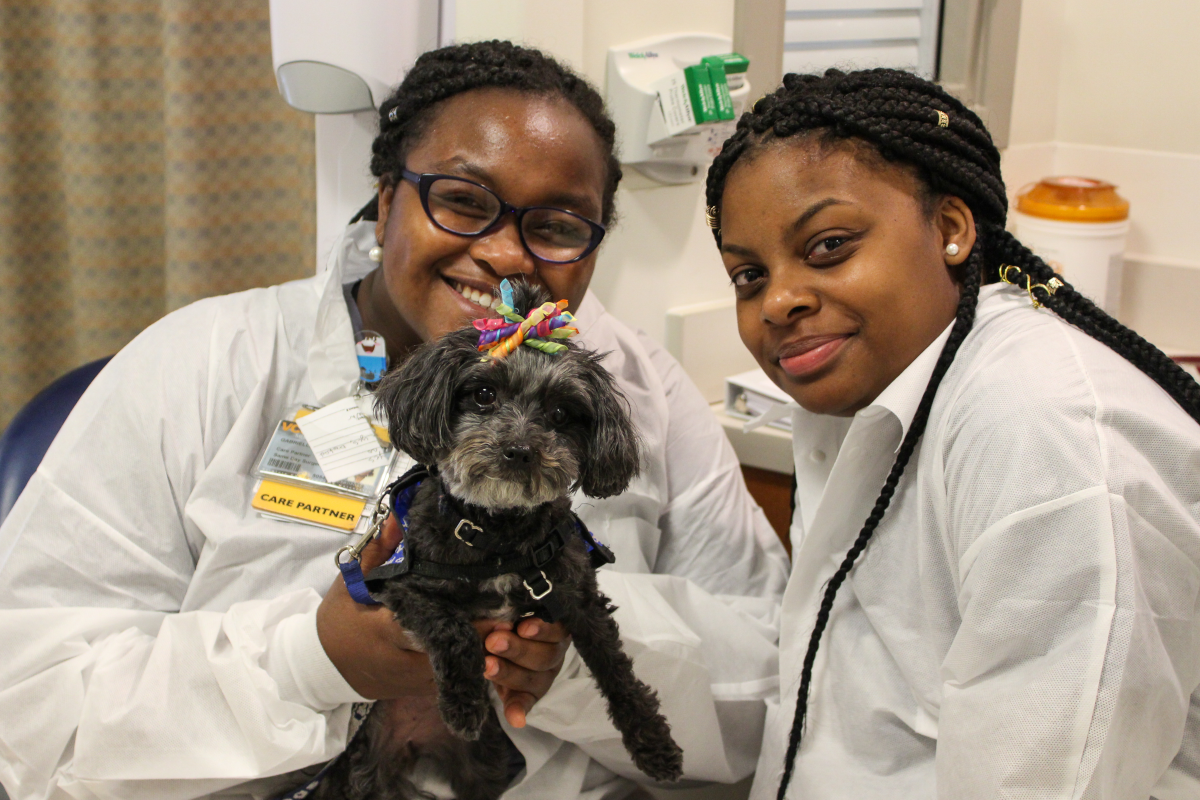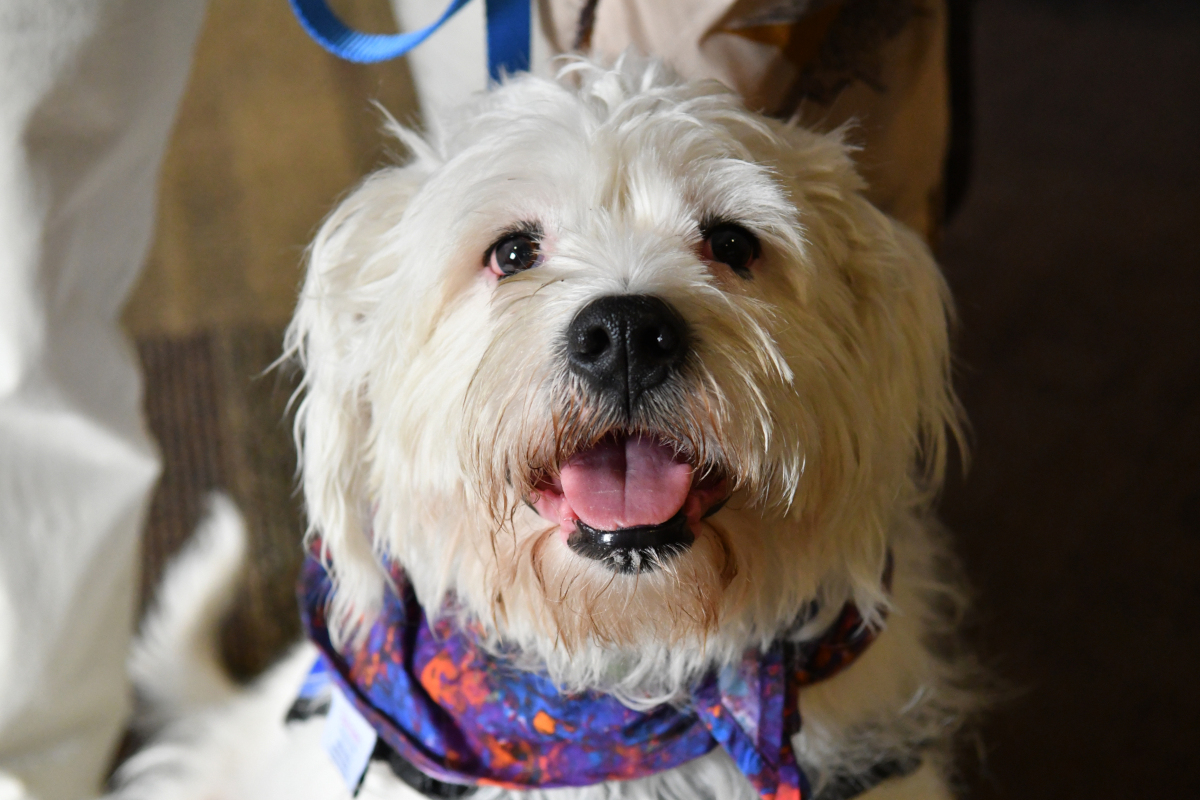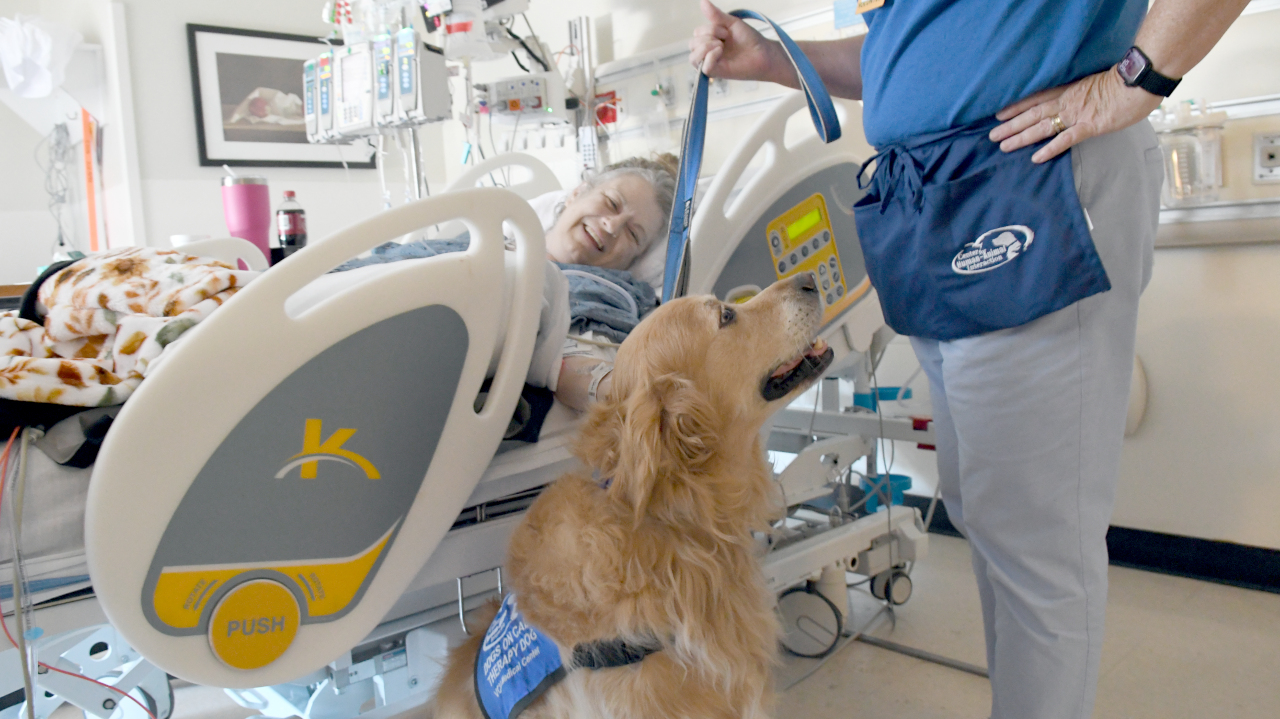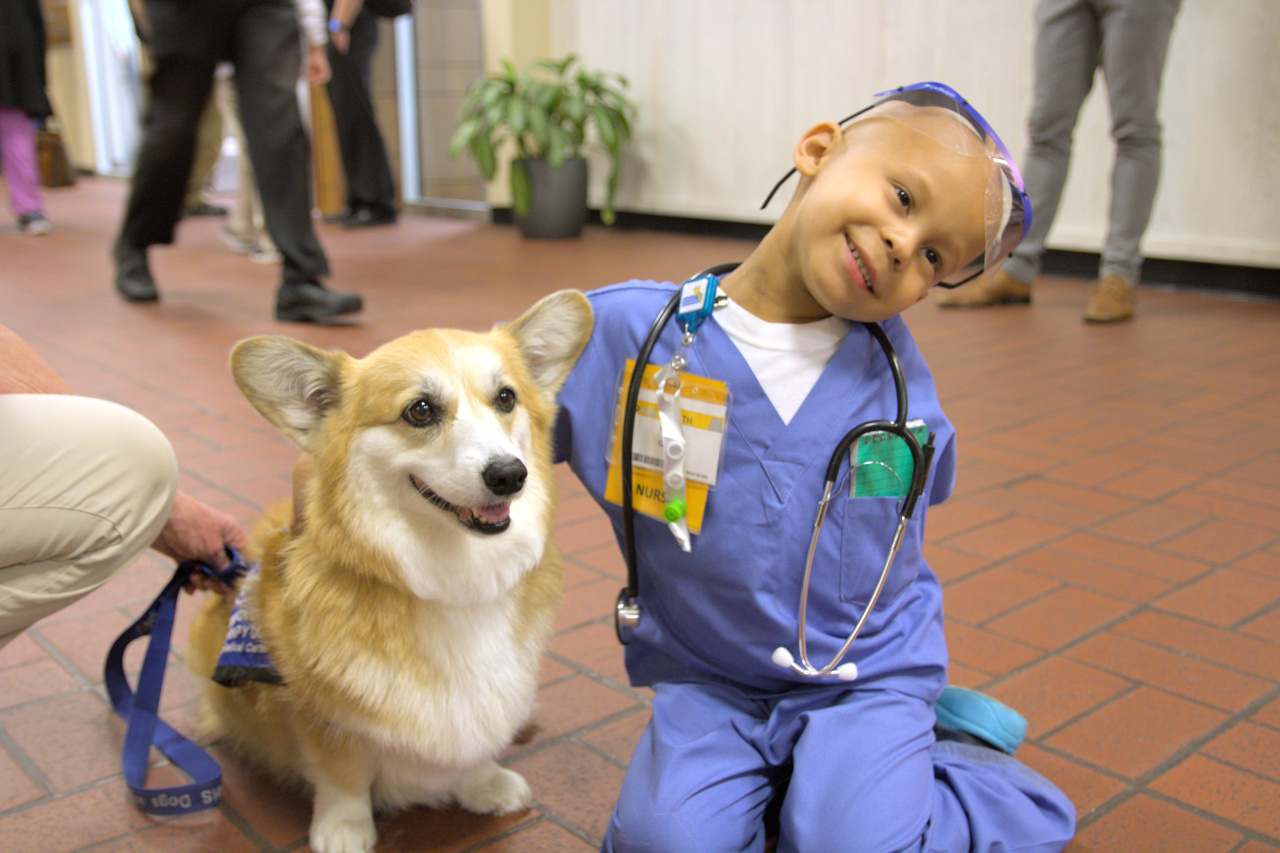Joining Dogs on Call

In the world of cancer, each therapy has its place. Mental therapies are often undervalued, and therapy dog visits offer more than just a distraction - they provide genuine emotional support. For patients like me, these visits can serve as a beacon of hope and comfort, reminding us of the love and companionship that exists outside the hospital walls. Wiley visited me twice during my inpatient stay for chemotherapy, and his soothing presence provided a welcome break from the stress and discomfort of medical treatments. During our visits, I could feel my stress levels lowering as my spirits were lifted, making my hospital experience a little brighter.
Sarah
Dogs on Call Client
Why You Should Volunteer with Dogs on Call
Do you think your dog would be a good therapy dog? If so, please consider joining Dogs on Call.
The Dogs on Call program is unique in that there are no membership dues or application fees, and that we provide our dog/handler teams with all the equipment they need at no cost to the handler.
What we provide
- The gear you need to volunteer in the hospital
- Free volunteer parking
- A supply of trading cards featuring your Dogs on Call dog
- Quarterly volunteer meetings, a weekly newsletter, and continuing education to help you and your dog have the very best experience



Phoebe and I are long-timers, but there are things I will never get used to. When patients and staff tell us, ‘you made my day,’ it’s always given me goose bumps and probably always will. Volunteering through Dogs on Call has been the most rewarding experience I've had in my volunteer life.
Marcia & Phoebe
Dogs on Call Team
The Four Steps to Joining Dogs on Call
No matter where you are in your training journey, if your dog is a good fit for therapy dog work we’d love to connect with you. Once you complete the interest form, a Dogs on Call therapy dog handler or the program’s Volunteer Coordinator will reach out to you to help you navigate the remaining steps.
All Dogs on Call teams must be registered with either Pet Partners (PP) or with the Alliance of Therapy Dogs (ATD). If you choose registration with ATD, your dog will also need to complete the American Kennel Club's Canine Good Citizen (CGC) certification. For a quick description of each, take a look at our Accepted Therapy Dog Organizations.
Once you have completed the registration process, email us a copy of your registration (if you registered with ATD, remember to also send us your CGC certificate).
The next step to joining Dogs on Call is for you to be cleared to volunteer at VCU Health. We will put you in touch with VCU Health’s Volunteer Services, who will provide the necessary volunteer orientation. Again, there is no cost to become a hospital volunteer.
Next, we will send you a copy of our Dogs on Call Volunteer Manual, Policies and Procedures, and Code of Conduct for you to review. After signing an agreement to follow the Dogs on Call policies and procedures, you will complete a series of three or more shadows. The number of shadows is dependent upon both you and your dog's comfort levels in a hospital setting, your desire to get extra practice, and any observations made by a member of our staff.
- You shadow a current Dogs on Call dog/handler team without your dog.
- You and your dog do a practice visit in West Hospital with our staff present to support you. You can do as many of these as you'd like.
- You and your dog visit in the hospital with a member of our staff accompanying you.
Once you have successfully completed these steps, congratulations and welcome to Dogs on Call! We are delighted to have you join the Dogs on Call family!

Missy and I were completing visits when a nurse approached us and asked us to visit a floor that was having a 'really hard day.' When we arrived, Missy immediately got to it, spreading her love and providing moments of respite to teary-eyed staff. As I watched her do her magic, I knew that this was exactly where we were supposed to be.
Tracy & Missy
Dogs on Call Team
Frequently Asked Questions
Many good dogs would not make good therapy dogs. Therapy dogs don’t have to be perfect, but there are several skills that are essential to them doing the work well. Good therapy dogs…
- Follow their handler’s instructions even when they are distracted or anxious.
- Enjoy visiting with strangers and receiving attention, but can also tolerate it when they are ignored.
- Rarely bark or lick people, and don't jump up on them.
- Tolerate being touched in ways that dogs do not typically enjoy (e.g. being pat on the head) and do not dodge or avoid attempts to pet/touch them.
- Face unknown environments with confidence, and recover quickly if something startles them.
- Ignore other dogs unless their handler gives them permission to engage.
The handler is just as important to the team’s success. Good therapy dog handlers…
- Monitor their dog for signs of fatigue or stress.
- Advocate for their dog in all situations, including cutting visits short when needed.
- Vigilantly scan their surroundings for hazards to their dog (e.g. broken glass, medication on the ground, etc.).
- Remain professional and respectful at all times, especially towards people who do not reciprocate that professionalism or respect.
All dog breeds and dog breed mixes are welcome, but your dog must be at least one year old to join Dogs on Call. We are honored to have had dogs of a multitude of different breeds join our program, from Maltipoos to Berners to mystery mixes that keep us guessing. Regardless of breed, breed combos, size, color, or any other attribute, your dog must enjoy the work and be able to do it safely.
This varies greatly depending on factors such as the dog’s temperament, the handler’s training experience, and the strength of the bond between the dog and handler. Experienced trainers are often able to prepare a dog by the minimum age of one year. For most others this takes longer, and may require taking training classes with the dog, waiting for the dog to mature past the high-energy puppy stage, or building the dog's confidence so that they are more comfortable in novel settings.
Our visit requirements parallel the requirements of the therapy dog registering organizations we accept. At least one visit is required every three months. The maximum visit time limit is 2 hours for a given day, but people may opt to bring their dog on more than one day per week. It's entirely up to you and your schedule. The hospital is open 24 hours a day and you can opt to visit at any time during the day or night. We just ask that you schedule your visits in advance.
Please complete the Dogs on Call Interest Form if you would like to join us. If you have additional questions, do not hesitate to ask us at chai@vcuhealth.org or by calling us at (804)827-PAWS.
Dogs on Call teams primarily visit patients, staff, and visitors throughout the VCU Medical Center, including at the Children's Hospital of Richmond and some outpatient clinics, and other VCU Health campuses including Stony Point, Short Pump Pavilion, Virginia Treatment Center for Children, Community Memorial Hospital, and Tappahannock. Dogs on Call teams also visit through out the VCU campus.

It doesn’t matter if it is a patient, family member, nurse, doctor, staff, or researcher, and it doesn't matter if is in a hospital room, waiting room, elevator, or hallway. I've learned that each visit is meaningful and important for that person, in that moment. And honestly, Homer has so much love that he doesn't even care whose petting him and giving him attention. It's a win-win for everyone.
Susie & Homer
Dogs on Call Team
Resources for Becoming a Therapy Dog Team

As a cancer survivor who has benefited from the ‘other end of the leash’, I can testify that a therapy dog visit made such a big impact on me that I committed to pursuing the work. I’m so fortunate to have my sweet Cassie to share with others, since I know personally the difference she can make.
Donna & Cassie
Dogs on Call Team